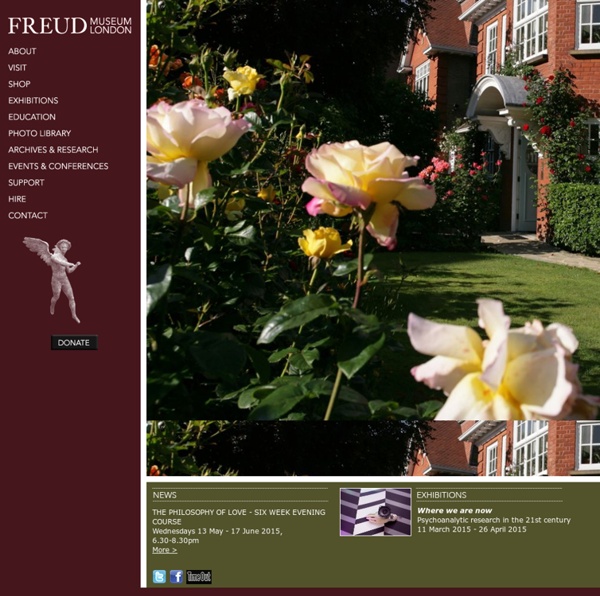



Freud Sigmund "Dans un essai paru en 1925 intitulé : «Présentation de moi-même » (2) Sigmund Freud nous indique expressément que chez lui la vie, l'oeuvre et l'accueil qui leur fut réservé ne doivent jamais être dissociés si on veut comprendre sa découverte de la psychanalyse à la fois comme pratique thérapeutique et comme théorie métapsychologique. Dans cette étroite liaison, un élément pourtant va finir par dominer au point d'en constituer le véritable projet existentiel: la volonté de comprendre la seule chose qui importe à la fin, l'homme. «Ma Présentation de moi-même montre comment la psychanalyse devient le contenu de ma vie, et se conforme ensuite à ce principe justifié que rien de ce qui m'arrive personnellement ne mérite d'intéresser au regard de mes relations avec la science.» (3) Une vie, une oeuvre Pour lui être fidèle, le mieux est peut-être encore de suivre son propre récit autobiographique que l'on pourrait intituler, à la manière d'Alain, «l'histoire de mes idées». Notes2. Freud.
Les Mathèmes de Lacan Anthologie des assertions entièrement transmissibles et de leurs relations dans les écrits de Jacques Lacan I am happy to present here the hypertext version of a book I wrote and that was published a few months ago by Lysimaque in Paris. This writing is dedicated to those who wish to navigate through the terms promoted by Jacques Lacan, while inventing their own progress. This route will build a personal labyrinth. This labyrinth has the structure of a knot which will wedge on each term. Users who wish to comment or criticize or report errors are more than welcome. If you found this Hypertext book useful, you can receive a hard copy of it. Cet ouvrage, présenté ici en format hypertext, est le portage sur Internet d'un livre que j'ai écrit et qui est édité par les éditions Lysimaque à Paris. Ce livre est mis à la disposition des utilisateurs qui souhaitent parcourir les termes lacaniens en inventant leur propre cheminement. Les lecteurs qui souhaitent rapporter des erreurs ou faire des commentaires ou des critiques sont les bienvenus. Paris, mai 1997. Paris, janvier 2000.
Sigmund Freud Sigmund Freud photographié par Max Halberstadt, vers 1921. Signature Sigmund Freud, né le 6 mai 1856 à Freiberg (empire d'Autriche) et mort le 23 septembre 1939 à Londres, est un neurologue autrichien, fondateur de la psychanalyse. Freud regroupe une génération de psychothérapeutes qui, pas à pas, élaborent la psychanalyse, d'abord en Autriche, en Suisse, à Berlin, puis à Paris, à Londres et aux États-Unis. En dépit des scissions internes et des critiques, la psychanalyse s'installe comme une nouvelle discipline des sciences humaines dès 1920. En 1938, Freud est menacé par le régime nazi et quitte Vienne pour s'exiler à Londres, où il meurt d'un cancer de la mâchoire en 1939. Le terme de « psycho-analyse » apparaît pour la première fois en 1896 dans un article écrit en français, publié dans cette langue le 30 mars 1896, puis en allemand le 15 mai 1896. Ce faisant, la discipline créée par Freud, critiquée ou non, garde aujourd'hui une certaine place dans la culture occidentale.
Psychanalyse de l'Indicible Maria Montessori Maria Montessori Nombreuses sont les écoles « Montessori » de par le monde, et certains illustres personnages, tels Brin et Page, fondateurs de Google, en ont fréquenté les rangs. Si ces écoles sont présentes en France, l'Education nationale, quant à elle, ne se réfère pas explicitement aux principes pédagogiques du docteur italien. Il nous a cependant paru intéressant de proposer la biographie de ce pédagogue, qui, tel Célestin Freinet, a contribué aussi, même indirectement, à l'avancée progressive des pratiques pédagogiques dans nos classes, et sûrement aussi dans nos CDI. Pour ce retour sur la vie de Maria Montessori, nous avons choisi une entrée spécifique, celle de l'éducation à la paix. Dates principales 1870 : naissance à Chiaravalle, province d'Ancône, Italie. 1883 : installation de la famille à Rome 1896 : Maria Montessori obtient son titre de docteur en médecine. C'est paradoxalement sa profession de médecin qui va l'amener à s'interroger sur la pédagogie. Entre deux guerres
Cours Jacques Alain Miller "La seule formation que nous puissions prétendre à transmettre à ceux qui nous suivent s'appelle un style" Jacques Lacan Vous trouverez ici un ensemble de textes inédits et d'informations sur l'étude de la psychanalyse dans le cadre de l'Ecole de la Cause freudienne. Le Séminaire de Lacan propose des introductions inédites à la lecture des séminaires publiés ; le cours de Jacques-Alain Miller, une présentation de son cours depuis son origine, le cours de cette année " Choses de finesse en psychanalyse" et des textes choisis.